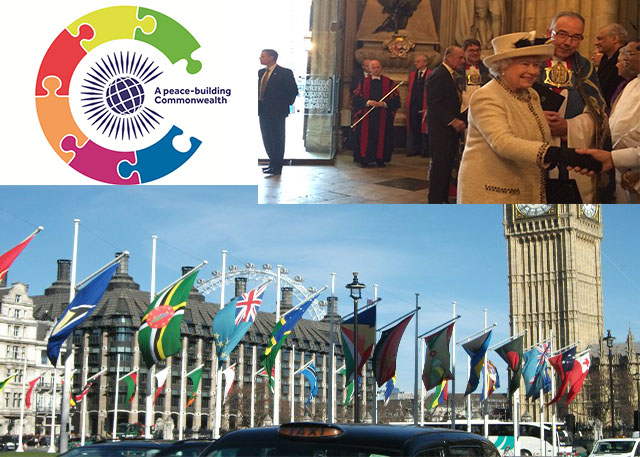 Sir Peter Marshall answers our questions on the role of Commonwealth Day in 2017.
Sir Peter Marshall answers our questions on the role of Commonwealth Day in 2017.
The Round Table’s Website Editor put some questions to former Commonwealth official and British diplomat Sir Peter Marshall about the meaning of Commonwealth Day in 2017.
Q: How has the Commonwealth changed since the last Commonwealth Heads of Government Meeting (CHOGM) and Commonwealth Day 2016?
A: ‘Momentum’ is the right word – it has not changed since the Malta CHOGM or since Commonwealth Day last year. We have an ongoing net-worked process. It encompasses the fruitful outcome of the Malta CHOGM itself, the role of the dynamic Prime Minister of Malta as Chairperson-in-Office, serving continuity until the next CHOGM, which is to be held in the UK in 2018, with all the opportunities and possibilities which that location can vouchsafe, both at and around the CHOGM itself and in the years thereafter. While the British Prime Minister in her turn is the Chairperson-in-Office; for the first time we have a woman Secretary-General, endowed with an extraordinary record of past achievement, and, on the non-official side, a gloriously diverse array of independent-minded associations and individuals, whose awesome expertise is matched by their enthusiasm.
Q: Does Commonwealth Day still have a meaning in today’s world?
A: I have more than a little sympathy for people who think that we have reached the stage of Anniversary Fatigue. There have been a good many anniversaries in recent years and there are more to come.. Yet so much depends on how we mark them. It is not a matter of looking back per se but rather to learn from the past in order to manage the future more competently. That is important not only in itself but also as a means of making society more cohesive by bringing the generations together. One of the least unsatisfactory definitions of a nation is that it is “a community of memory”. The Commonwealth likewise is a community of memory.
Commonwealth Day, the second Monday in March, is a recent invention, forty years ago, replacing Empire Day (Queen Victoria’s Birthday). It was so chosen by Commonwealth Heads of Government because it was at a time when most Universities and schools across the Commonwealth would be in session rather than on vacation. That helps to spread the word.
Q: The UK will be the next host of the CHOGM: what needs to be done to get the people of the UK to focus on the Commonwealth?
A: The operative word here is ‘focus’. There are so many different facets to the Commonwealth that if you pick on one or two of them, you may miss out on a good deal elsewhere. But you can’t do everything; some concentration is inevitable on practical grounds. On that basis, one would naturally put trade at the top of the list of priorities and with an eye on world economic conditions, current and prospective, the rate of technological change, and even the nature of work itself. At the same time we need to bring home to our compatriots the importance on the Commonwealth as a factor in our role in the world and the influence we can hope to exert. There is much to be done by way of public discussion in advance of CHOGM 2018. I like to think that the appetite for it will grow.
This, of course, is not a matter for governments alone. It will be an unrivalled opportunity for the various Commonwealth organisations to display their wares.
And it will be essential to have some festivities. In recent years there have been some marvellous events on great occasions: the Year of the Olympics, 2012, the Commonwealth Games in Glasgow, 2014, Magna Carta 800, VE/VJ Day+70, 2015 and The Queen’s Ninetieth Birthday, 2016.
Q: Can this be done for the sake of Commonwealth relations and not just as an antidote to Brexit?
A: A very fair question in the circumstances. The diplomatic answer is that the attitude in the first instance of any democracy to participation in an international organisation has to be “what is in it for us?” Enlightened self-interest may suggest a more altruistic answer to the question than one would from Mr Scrooge. For the reasons outlined above, the British Government had hoisted in well before the referendum how much scope there was in enhanced participation in Commonwealth activities. Brexit will certainly have heightened that appreciation. But it would be a change of degree rather than in kind.
One can also turn the proposition round and ask how far Commonwealth considerations could affect the way the UK plays the Brexit. The outcome of the meeting of Commonwealth Trade Ministers may shed some light on the point.
Sir Peter Marshall is a former Commonwealth Deputy Secretary-General. He has also served with the Foreign & Commonwealth Office and as Britain’s Representative to the United Nations. He has also served as the Chair of the Royal Commonwealth Society.
Related articles:
Focus on Commonwealth Day – Part one
Commonwealth Secretary-General’s 2017 Commonwealth Day message
From 2016: Does Commonwealth Day still matter?



